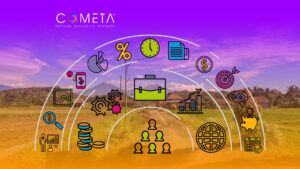Funding horizontal learning is crucial for organizations to effectively navigate complex challenges and maximize collaborative resource use. This approach fosters meaningful knowledge exchange and cooperation, strengthening both individual organizations and the sector.
For donors, investing in these spaces not only empowers organizations at an individual level but also enhances coordination and collective impact across the network.
— María Mac Gregor, Junior Consultant at Colectivo Meta
What is Horizontal Learning, and Why is Funding It Essential?
Horizontal learning is a peer-driven exchange and collective reflection among organizations within a shared practice community. For civil society organizations, this approach allows us to learn from one another, drawing on our experiences, challenges, and solutions to strengthen our advocacy and impact.
Here are the key benefits of funding horizontal learning:
- Capacity Building – Enhances skills and knowledge by identifying best practices and refining tools, helping organizations tackle challenges more effectively.
- Contextualized Problem-Solving – Supports the adaptation of solutions to local realities by sharing experiences that consider legal frameworks, social dynamics, and available resources.
- Strengthening Collaboration – Fosters trust-based networks and solidarity, encouraging cooperation across different actors and the development of high-impact joint strategies.
For example, during the pandemic, many organizations had to quickly adapt to managing remote teams. Through a knowledge-sharing process, organizations were able to learn from one another and improve their capabilities to navigate this challenge successfully.
Why Should Donors Invest in Horizontal Learning?
When organizations exchange experiences and knowledge, they strengthen their capabilities, leading to greater preparedness and more effective advocacy. This is particularly valuable for donors, as better-equipped organizations are more likely to fulfill their goals and create meaningful impact.
Horizontal learning fosters collective change. It enables civil society organizations to tackle complex issues more effectively through shared strategies and solutions. In contexts where civic space is shrinking, these learning processes become even more crucial, helping organizations avoid isolation and coordinate common responses to emerging challenges.
How To Find Funding for Horizontal Learning?
To ensure the long-term sustainability of knowledge-sharing and collective reflection spaces, it is essential to seek strategic funding that values collective knowledge generation and the transformative impact these processes have on our ecosystem.
Organizations can approach shared donors or seek new allies to support horizontal learning initiatives. These spaces offer key benefits:
- Facilitating knowledge exchange among organizations of different sizes, backgrounds, and areas of expertise.
- Building collective solutions tailored to local contexts.
- Strengthening support networks, even in challenging conditions.
When advocating for horizontal learning funding, consider emphasizing:
- These processes not only strengthen participating organizations but also reinforce the broader civil society ecosystem, enhancing resilience and advocacy effectiveness in tackling complex challenges.
- Funding collective learning spaces is a high-impact strategy for donors, allowing them to maximize the effectiveness of their support.
- Instead of benefiting a single organization, donors empower multiple organizations that share aligned goals—fostering collaboration, knowledge exchange, and broader advocacy.
- Investing in relationships between organizations cultivates trust-based networks, enabling stronger joint initiatives with long-term potential.
Key Benefits of Financing Collaborative Learning Spaces
Securing funding for horizontal learning not only enables more organizations to participate in knowledge-sharing spaces but also amplifies the collective impact of our work. These processes strengthen skills, foster collaboration, and facilitate joint problem-solving on complex issues.
To ensure the sustainability of these spaces, it is essential to seek strategic funding that highlights the value of horizontal learning. When crafting funding proposals, organizations should emphasize the dual benefits for both civil society groups and donors—as it allows for more efficient resource allocation and broader impact reach.
By supporting horizontal learning initiatives, donors contribute not only to strengthening individual organizations but also to building more effective, locally adapted solutions through collective efforts.If your organization is seeking support for a horizontal learning initiative, COMETA can guide you. Explore the challenges and opportunities within these spaces:
🔗 Discover more





